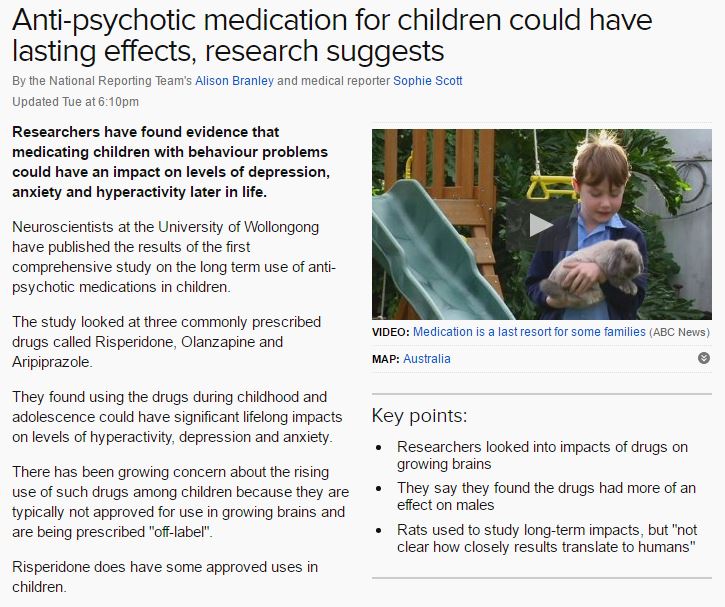Neuroscientists have just released the results of a study on the long-term use of antipsychotic drugs in children. The growing brain adapts to the drugs, which block receptors, by creating more receptors, which can lead to more symptoms, including hyperactivity, depression, and anxiety, according to the study author, Michael De Santis. “[This] would then cause an opposite effect of what the drugs were used for,” he said.
-
It doesnt surprise me that psychiatric drugs can drive children mad and that coming off the drugs can drive them mad as well. I have experienced this.
My last hospitalisation was in 1984, (I had to fight my way in to the Unit after being injected a day or two before) and the Prognosis was : “This gentleman’s problems have not been sorted out and we are expecting to see him back in the near future”.
Parents might consider “medication” as a last resort if the don’t know any better. Most psychiatrists would probably say that they consider “medication” to be a last resort. But there are more effective solutions.
-
This, of course, would be exactly what would be expected based on years of research on illicit drug use and its effect on the brain, much of which was solidly established as early as the 1980s. Why anyone would think that a doctor prescribing a substance that impacts neurotransmitters would make any difference in its long-term effects is baffling in the extreme.
—- Steve
-
In treating a NON physical disease with physical means, you create a physical problem. How elementary. Who is going to be held accountable for this quackery? Like police do not police themselves. Doctors must police themselves better.
-
Part of the problem is the lawyers are not taking the cases.
-
-
Love this site, but please, MIA news editors, do a better job of presenting research in this field. Your lead sentence, “Neuroscientists have just released the results of a study on the long-term use of antipsychotic drugs in children.” is simply wrong — this was a rat study, and didn’t involve any tests in (human) children. The rat info — critical in understanding this work — is buried. You provide no link to the original research (here it is, for those who are interested: https://www.researchgate.net/publication/284173019_Early_antipsychotic_treatment_in_childhoodadolescent_period_has_long-term_effects_on_depressive-like_anxiety-like_and_locomotor_behaviours_in_adult_rats ). The news story you link to is similarly deficient. Looking forward to your doing more complete, less misleading work in the future.
-
“[This] would then cause an opposite effect of what the drugs were used for,” isn’t this what we all have been saying for ages?
Wow, and the doctors are just now doing testing on rats to figure this out? They should have listened to their patients decades ago, before tranquilizing, torturing, and destroying the lives of millions of children (and adults), for profit.
Although, the doctors did know that both the antidepressants and antipsychotics make people “mad as a hatter” / “psychotic,” via anticholinergic toxidrome, long ago.
https://en.wikipedia.org/wiki/Toxidrome
It strikes me today’s doctors are either the most unethical, or the dumbest, doctors to have ever existed. Oopsies, their “dirty little secret” way of profiteering off covering up child abuse and easily recognized iatrogenesis is out of the bag.












